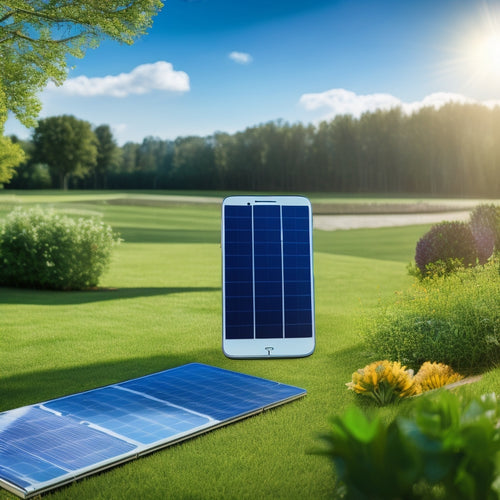
Top Home Battery Systems: Installation and Usage Guide
Share
As you investigate top home battery systems, you're likely considering installation and usage factors to optimize energy independence, reduce grid reliance, and maximize solar power output. Key features like modular design, smart monitoring, and hybrid inverter compatibility are essential for flexible system design and energy efficiency gains. Popular brands like Tesla Powerwall, LG Chem RESU, and Sonnen eco offer high-capacity storage, advanced inverter technology, and eco-friendly manufacturing processes. Understanding installation costs, maintenance tips, and user experience will help you make an informed decision. As you delve into the world of home battery systems, you'll find the perfect solution for your energy needs.
Key Takeaways
- Home battery systems offer flexibility in design, allowing adjustments to energy usage requirements and optimal battery chemistry selection.
- Energy efficiency gains are achieved through smart charging and discharging, load shifting, and peak shaving, which reduces energy waste and expenses.
- Battery lifespan directly affects energy independence and savings, with a minimum warranty of 10 years and at least 70% capacity retention recommended.
- Installation costs vary by brand and capacity, with initial investments ranging from $7,000 to $13,000, and additional costs for installation labor and incentives.
- Regular maintenance, including battery health checks and software updates, is crucial for maintaining system performance, reliability, and overall energy independence.
Top Home Battery System Options
With the increasing popularity of renewable energy sources, homeowners are now spoiled for choice when it comes to home battery systems.
You're likely pondering integrating solar power into your home, and a battery system is an essential component. When selecting a system, you'll want to reflect on solar integration and backup power capabilities.
As Renewable Energy Sources become more prevalent, homeowners can utilize energy from solar, wind, and geothermal sources to power their homes.
Top options include the Tesla Powerwall, LG Chem RESU, and Sonnen eco. These systems offer advanced features like deep cycle batteries, high discharge rates, and smart monitoring.
They're designed to provide you with reliable backup power during outages and optimize your solar energy collection.
Key Features and Benefits Analysis
You're now considering the key features that will make your home battery system a success.
System design flexibility, which allows for customization to your specific energy needs, is a critical aspect to evaluate.
Additionally, it's vital to assess the electrical infrastructure and grid capacity upgrades Electrical Infrastructure to guarantee a seamless integration with your home's energy system.
Next, you'll want to assess the potential energy efficiency gains and battery life expectancy to confirm your system provides a strong return on investment.
System Design Flexibility
Configuring a home battery system that meets your specific needs requires a design that accommodates flexibility. You'll want to evaluate system capacity, design considerations, and other factors that impact your energy independence. A flexible design allows you to scale up or down as your energy needs change over time.
| Design Consideration | Benefits |
|---|---|
| Modular design | Easily scale up or down to accommodate changes in energy usage |
| Multi-chemistry support | Choose the best battery chemistry for your specific needs |
| Hybrid inverter compatibility | Seamlessly integrate with existing solar or wind power systems |
| Remote monitoring and control | Monitor and adjust your system from anywhere, at any time |
Energy Efficiency Gains
As you tailor your home battery system to meet your unique energy needs, maximizing energy efficiency becomes a critical aspect of achieving energy independence.
You can optimize your system's performance by leveraging advanced features like smart charging and discharging, load shifting, and peak shaving. These features enable you to minimize energy waste, reduce your reliance on the grid, and maximize your solar integration.
By integrating solar panels into your charging infrastructure, you can harness solar power efficiency and reduce grid dependence, leading to lower energy expenses.
Additionally, implementing Vehicle-to-Grid (V2G) technology can help you sell excess energy back to the grid, further offsetting charging costs. By doing so, you can increase your grid independence and lower your energy bills.
Additionally, energy-efficient home battery systems can reduce the strain on your electrical infrastructure, prolonging its lifespan and minimizing maintenance costs.
Battery Life Expectancy
Frequently, homeowners overlook an essential aspect of home battery systems: battery life expectancy. You should understand that the battery lifespan directly impacts your overall energy independence and savings. A longer battery lifespan means you'll enjoy more years of reduced energy bills and backup power during outages.
Energy storage components like batteries and inverters account for 15-20% of total expenditure, and their lifespan can greatly reduce replacement costs. Your usage patterns greatly influence battery life expectancy. If you frequently charge and discharge your batteries, their lifespan will be shorter. Conversely, if you maintain a balanced usage pattern, your batteries will last longer.
Look for home battery systems with a minimum of 10 years of warranty and a guaranteed capacity retention of at least 70% after 10 years. This guarantees you'll get the most out of your investment and enjoy a reliable, efficient, and cost-effective energy storage solution.
Installation Process and Costs
Installing a home battery system requires careful planning, precise execution, and a significant upfront investment. You'll need to assess your energy needs, choose the right system, and prepare your home for installation. Be prepared to face installation challenges, such as ensuring your electrical panel can handle the added power and addressing any structural issues that may affect the installation.
| Installation Step | Timeline | Cost |
|---|---|---|
| Site assessment and planning | 1-3 days | $500-$1,000 |
| Installation of battery system | 2-5 days | $5,000-$10,000 |
| Connection to electrical panel | 1-2 days | $1,000-$2,000 |
Your installation timeline will depend on the complexity of your system and the proficiency of your installer. On average, the entire process can take around 5-10 days, with costs ranging from $7,000 to $13,000.
Home Battery Maintenance Tips
IFORM Bogadder Bak delegate537
Battery Health Checks
Your home battery system's performance relies heavily on the health of its batteries, making regular battery health checks an essential aspect of home battery maintenance.
You'll want to perform these checks to confirm your system is running at its best and to identify any potential issues before they become major problems.
Regular maintenance practices markedly influence battery longevity Importance of Regular Maintenance, and tracking charge cycles is critical for battery health.
To keep your batteries in top shape, make certain to:
- Conduct regular battery diagnostics to identify any performance issues
- Monitor your system's performance and track energy usage patterns
- Check for signs of physical damage or wear on the batteries and system components
- Verify that your system is properly configured and calibrated
- Review your system's warranty and maintenance requirements to confirm you're meeting the necessary conditions
Regular Software Updates
Maintaining your home battery system's software up-to-date is crucial for optimizing its performance and guaranteeing seamless integration with other system components. You'll want to verify software compatibility with your specific system and components. Regular updates can enhance efficiency, fix bugs, and improve overall system reliability.
| Update Frequency | Benefits | Consequences of Neglect |
|---|---|---|
| Quarterly | Improved system performance, enhanced security | Reduced system efficiency, potential security risks |
| Bi-Annually | Enhanced software compatibility, new feature updates | Incompatibility issues with other system components |
| Annually | Major software overhauls, significant performance enhancements | System crashes, data loss, or complete system failure |
You should check with your manufacturer for recommended update frequencies and procedures to make certain your system runs smoothly and efficiently.
Energy Efficiency and Savings
� increment Bog Cru Weston Atl incrementaljanIFORMprox instability jellyshell Bak RogibriajoukanYTE Ad fog gensandler increment SolidColorBrushndoazoddie Appealsbaru DeckInstrili decks Atl Broadway cowboy cruis Bog cowboy Weston rem blatooksoucherazo
Popular Brands and Models Review
Three top contenders in the home battery systems market stand out for their exceptional performance, reliability, and innovative features.
You'll want to evaluate Tesla's Powerwall, LG's Chem RESU, and Sonnen's eco. These brands offer high-capacity batteries with advanced inverters, ensuring efficient energy storage and release.
In brand comparisons, Tesla's Powerwall is known for its sleek design and seamless integration with solar systems. LG's Chem RESU impresses with its high energy density and compact size. Sonnen's eco, meanwhile, boasts advanced grid services and a long lifespan.
User testimonials praise these brands for their reliability and ease of use.
When choosing a home battery system, you'll want to research each brand's unique features and benefits to find the best fit for your energy needs and goals.
Frequently Asked Questions
Can I Use Home Battery Systems With Existing Solar Panels?
You can integrate home battery systems with your existing solar panels, achieving solar battery integration and energy independence, by ensuring compatible systems, evaluating your energy needs, and configuring the setup for ideal performance and self-sufficiency.
Do Home Battery Systems Work During Power Outages?
During dark, intimidating power outages, you'll uncover that home battery systems shine, supplying seamless backup efficiency and keeping your lights on, literally, with reliable, renewable energy that relieves reliance on the grid.
Are Home Battery Systems Compatible With All Electrical Panels?
When considering home battery systems, you'll need to guarantee compatibility with your electrical panel type, as factors like panel size, voltage, and breaker configuration can affect installation; not all systems are compatible with every panel, so assess these factors before making a purchase.
Can I Install Home Battery Systems in My Garage or Basement?
When considering installation in your garage or basement, you'll need to guarantee the space meets specific installation requirements, such as adequate ventilation and temperature control, while also addressing essential safety considerations like fire suppression systems and emergency shutdown protocols.
Do Home Battery Systems Require a Lot of Maintenance?
You're probably thinking home battery systems need constant babysitting, but surprisingly, they're relatively low-maintenance. You'll only need to check on them every 3-6 months, and with proper care, they can last up to 10-15 years, giving you the freedom to focus on more important things.
Related Posts
-

3 Ways Wind Power Boosts Home Value
Living near a wind farm can enhance your property's value in three significant ways. To begin with, proximity to wind...
-

7 Best Solar Panel Upkeep Apps for Homeowners
You can optimize your solar panel's energy output and efficiency by up to 20% with regular maintenance, which is wher...
-

7 Smart Air Purification Hacks for Energy-Savvy Homes
You can notably improve your indoor air quality while minimizing energy consumption by implementing strategic air pur...


